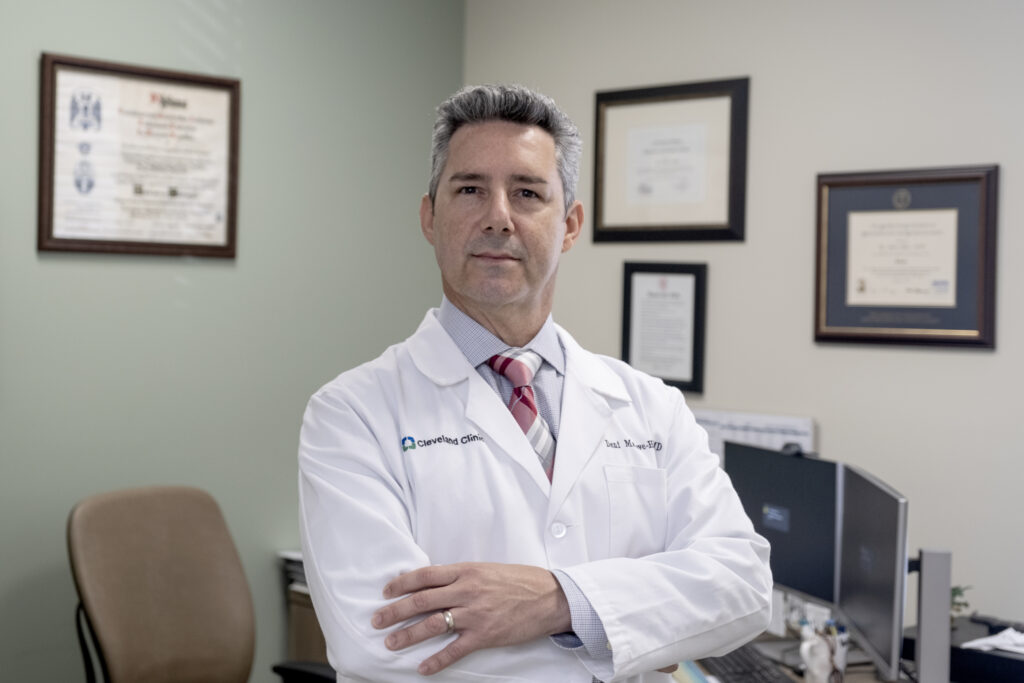Polycystic ovarian syndrome is a common problem for women of childbearing age, affecting up to 10 percent of the female population. It is also the leading cause of infertility and can increase the risk of other health conditions. That’s why if you are a woman experiencing irregular menstrual cycles, you should see your gynecologist and be checked for this condition.
“There are different definitions for polycystic ovarian syndrome (PCOS),” said Dr. Deni Malave-Huertas, a gynecologist with Cleveland Clinic Indian River Hospital’s Partners in Women’s Health in Vero Beach. “But the biggest consensus is that there are three characteristics, and a woman with two out of those big three can be diagnosed with PCOS.
“The first characteristic is having an ovary full of very small cysts called a string of pearls.
The second is having ovulation problems with irregular periods. And the third is hyperandrogenism, or higher levels of male hormones, which can lead to other medical problems such as high blood pressure and diabetes. High androgen can also cause acne and excess hair growth in women.”
According to Cleveland Clinic, polycystic ovarian syndrome is a hormonal imbalance that occurs when the ovaries create excess hormones called androgens, which cause reproductive hormones to become imbalanced. As a result, women with PCOS will have irregular menstrual cycles and unpredictable ovulation.
Due to the lack of ovulation, tiny cysts or fluid filled sacs with immature eggs form on the ovaries. It is possible, however, to have PCOS without visible cysts. The cysts are not painful or dangerous, but they can affect a woman’s ability to conceive.
“Fertility is one of the leading reasons why patients seek treatment, as a woman with PCOS is more likely to have difficulty getting pregnant,” Dr. Malave continued. “Their cycles are not synced. While we can’t cure PCOS, we can manage it with medications and supplements.
“Treatment for PCOS is targeted toward patient expectations and desires. If a patient wants to get pregnant and she doesn’t have regular periods, then we address ovulation. If she doesn’t want to get pregnant, we treat it with birth control pills, which is the quickest way to fix it. We have to address the patient’s desire at the moment.
“By using birth control pills, we basically shut down your system, taking away your body’s response and allowing the birth control pills to feed the hormones,” he explained. “This causes shedding of the lining of the uterus so the uterus builds and cleans itself every month. That way we avoid overgrowth of the tissue that grows inside the uterus.”
Cleveland Clinic states that treatment for a patient with PCOS who isn’t planning on getting pregnant can include hormonal birth control to regulate the menstrual cycle, medications to block androgens, and insulin-sensitizing medicines. For patients who want to become pregnant, there are drugs that induce ovulation such as clomiphene and letrozole, which are taken orally, and gonadotropin, which is given by injection. If the medication doesn’t help with ovulation, in vitro fertilization (IVF) is an option.
While the exact cause of PCOS is still undetermined, studies have found a high genetic disposition, meaning that if the mother has it, the daughter is likely to have it. Unfortunately, the gene for that disposition has yet to be identified.
Insulin resistance is another identifiable factor, as an increase in insulin causes human ovaries to make and release male hormones (androgens), which suppress ovulation. Being overweight can lead to insulin resistance, so patients diagnosed with PCOS are encouraged to maintain a healthy weight.
“Further complications can arise for a patient with PCOS. A patient with very little ovulation will not clean the inside of the uterus regularly, which can lead to endometrial cancer, which is cancer inside the uterus. Conversely, PCOS does not increase your risk of developing ovarian cancer.
“PCOS is a condition that is not curable but treatable,” Dr. Malave concluded. “It’s important to remember that we treat the symptoms dependent upon where that patient is in life. My goal is to help the patient at that time and find the best way to address and regulate the condition.”
Dr. Deni Malave-Huertas received his medical degree from the Universidad Autonoma de Guadalajara, Mexico and completed his residency in Obstetrics and Gynecology at San Juan City Hospital. He is accepting new patients at Partners in Women’s Health, 1050 37th Place, Vero Beach. Call 772-770-6116 to schedule an appointment.

